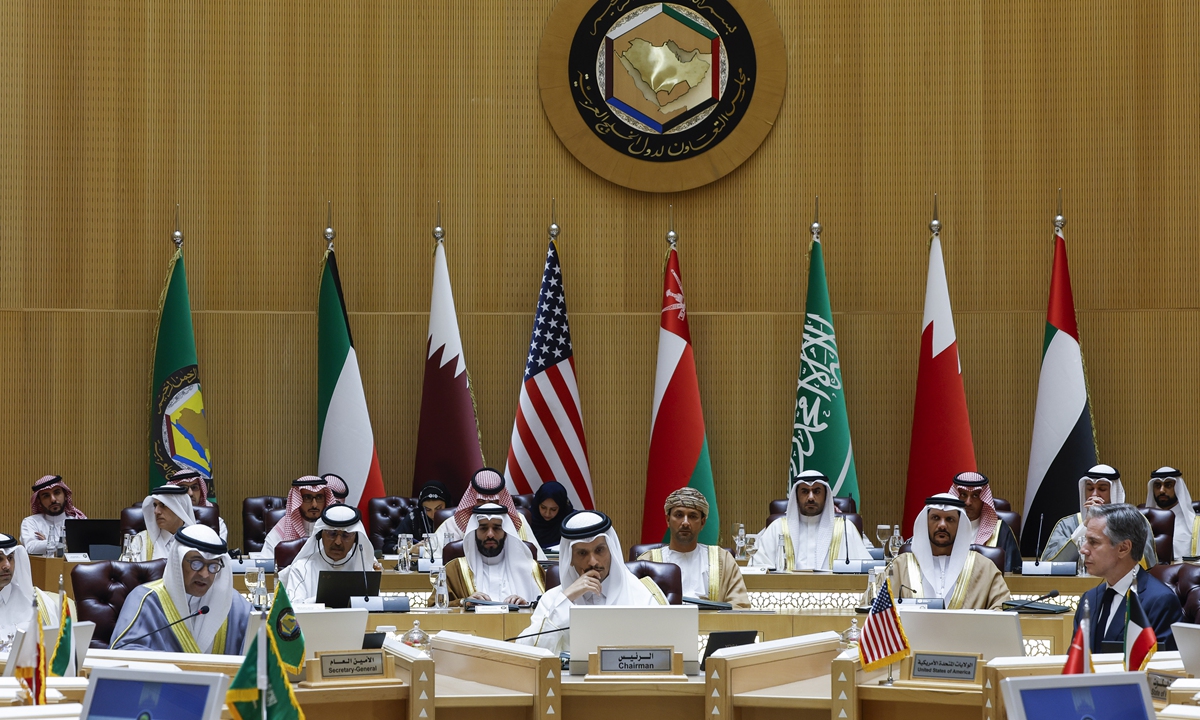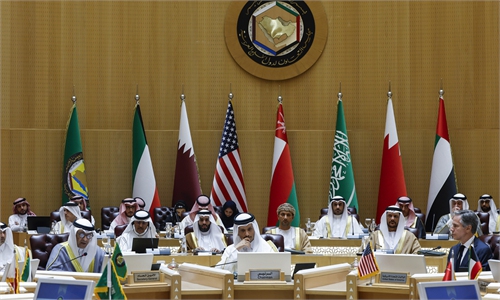Blinken faces difficult task ‘to stop bloodshed in Gaza’ with visit to Middle East

GCC Secretary-General Jassem Mohamed Albudaiwi, US Secretary of State Antony Blinken, Saudi Arabia's Foreign Minister Prince Faisal bin Farhan bin Abdullah and other officials attend a Joint Ministerial Meeting of the GCC-US Strategic Partnership to discuss the humanitarian crises faced in Gaza, in Riyadh, on April 29, 2024. Photo: VCG
US State Secretary Antony Blinken arrived in Saudi Arabia on Monday, the first stop in a broader trip to the Middle East that aims to mediate between Israel and Hamas and stop the bloodshed in Gaza. The conflict has already brought huge domestic and external pressures to Washington, as pro-Palestine protests across major universities in Western countries are making Washington's policy of tolerating Israel's operations look increasingly unjustified and embarrassing.Analysts said that the UN Security Council resolution for a ceasefire is being challenged, as Israel is still bombing Rafah, and if Blinken fails to make breakthrough, a brutal ground attack planned by Israel is very likely to happen and cause huge civilian casualties.
In Riyadh, Blinken is expected to meet senior Saudi leaders and also hold a wider meeting with counterparts from five Arab states - Qatar, Egypt, Saudi Arabia, the United Arab Emirates and Jordan - to discuss what governance of the Gaza Strip might look like after the Israel-Hamas war ends, according to a senior US State Department official, Reuters reported.
Blinken will also discuss with Saudi authorities efforts for a normalization accord between the kingdom and Israel, a deal that includes Washington giving Riyadh agreements on bilateral defense and security commitments as well as nuclear cooperation. In return for normalization, Arab states and Washington are pushing for Israel to agree to a pathway for Palestinian statehood, something Israeli Prime Minister Benjamin Netanyahu has repeatedly rejected, Reuters reported.
Israel has regularly carried out airstrikes on Rafah since the start of the war and has threatened to send in ground troops, saying the city is "the last major Hamas stronghold" in the coastal enclave. Over a million Palestinians have sought refuge in the city on the Egyptian border. Members of the international community have urged Israel not to invade, fearing a humanitarian catastrophe, AP reported.
According to AP on Monday, Israeli airstrikes on the southern Gazan city of Rafah killed at least 22 people, including six women and five children, Palestinian health officials said. One of the children killed in the strikes overnight into Monday was just 5 days old.
Hundreds of bodies were found days ago buried deep in the ground at Nasser Hospital and Al-Shifa Hospital in Gaza. The Office of the High Commissioner for Human Rights said reports continued to emerge about the discovery of mass graves in Gaza, media reported.
Chinese Foreign Ministry spokesperson Lin Jian said on Monday that "We are deeply shocked and strongly condemn the perpetrators of the atrocity. Vast swaths of Gaza are now left in rubble and over a million civilians are struggling in despair on the brink of death."
While answering a question about what role China has played in "the meeting between Hamas and Fatah in Beijing this day" reported by foreign media, Lin Jian that "China and Palestine share a traditional friendship. We support Palestinian factions in achieving reconciliation and increasing solidarity through dialogue and consultation. We will continue to work actively towards that end."
Wang Jin, an associate professor at the Institute of Middle Eastern Studies at Northwest University, told the Global Times on Monday that now the problem between Israel and Hamas is that they cannot reach agreement on an exchange of Israeli personnel detained by Hamas with an Israeli ceasefire, but if Blinken fails to make a breakthrough, the ground attack against Rafah is very likely.
Mei Hualong, an assistant professor at Peking University specializing in Middle East studies, told the Global Times on Monday that there is almost no mutual trust between Hamas and Israel, as Hamas believes that if they release all the detained Israeli personnel, Israel might break the ceasefire agreement and take military actions to try to eliminate Hamas in Rafah, despite the possibility of huge civilian casualties.
The US agrees with Israel's objective that Hamas needs to be eradicated and cannot play a role in Gaza's future, Reuters reported, but Washington does not want Israel to re-occupy the Gaza Strip. Instead, it has been looking at a structure that will include a reformed Palestinian Authority with support from Arab states.
Chinese experts said this is why Hamas cannot trust the US as a mediator, and hopes for an effective mediation remain low, because the idea of "eradicating Hamas" and a "sustainable ceasefire" cannot coexist. The bloodshed in Gaza will continue as long as the US and Israel believe that they can eradicate Hamas.


